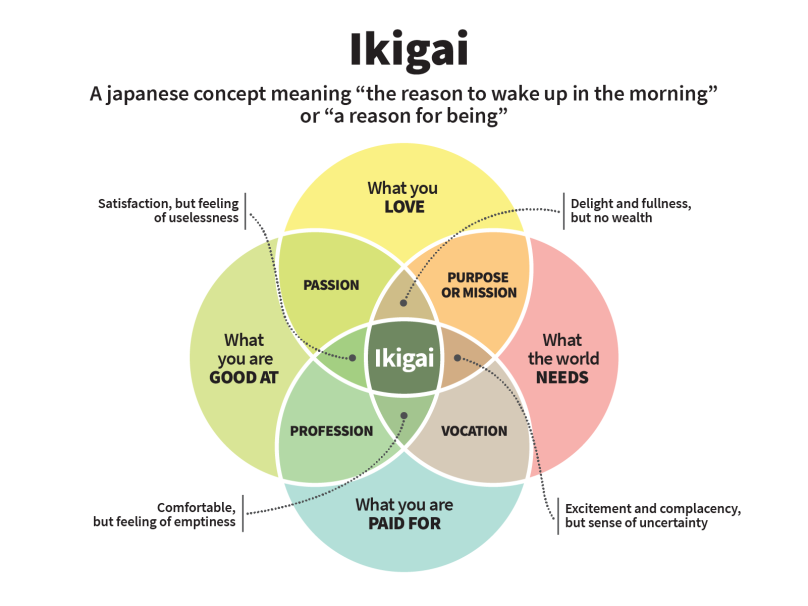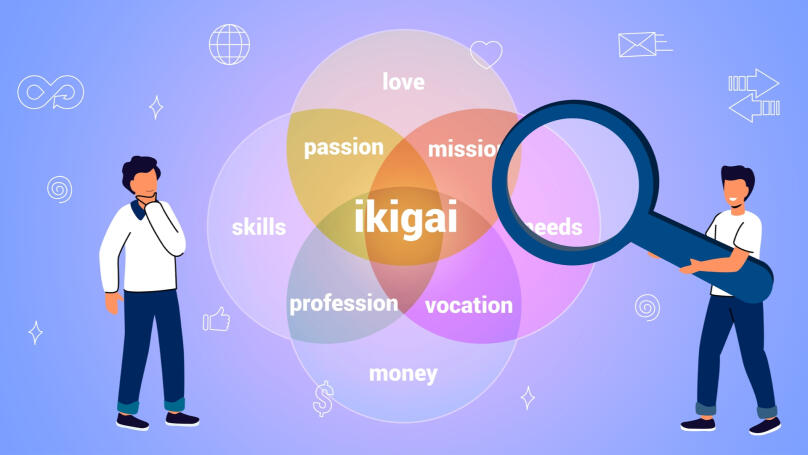Day 4. Ikigai: employing an ancient Japanese technique
As a part of the National Geographic program, researcher Dan Buettner has studied the so-called "blue zones" over five years, where the greatest number of centenarians are recorded living.

In this process, Dan Buettner discovered that Japan has the highest number of centenarians, particularly on the island of Okinawa, where the average age for women is 92 and for men 88. According to Buettner's observations, life expectancy was greatly influenced by several factors: regular physical exercise and spiritual practices that are a part of Japanese culture, a diet rich in seafood, fruits, and vegetables, and having your own ikigai. So, what is it, and why does it prolong life?
Ikigai cannot be translated into other languages. It stands for "the meaning of life", which is something that makes you happy and welcome each new day with joy. In other words, ikigai is a distinct Eastern philosophy based on life's purpose as a source of importance in your life and spiritual harmony. If you have found your ikigai, consider that you have found a happiness that no one will be able to deprive you of.
How to find your ikigai

Ikigai consists of the following four components:
-
What you love
-
What your strength is
-
How you earn
-
What other people need
To find your ikigai, you will need to draw a map, an example of which you will find below. The place where all the points intersect in the shape of circles reveals your ikigai. The points are described as follows:
-
Achievements. What accomplishments are you incredibly proud of? Write down at least 2-3 of these experiences, focusing on the memories that fill you with joy. This is your starting point in your search for ikigai.
-
Knowledge. What special knowledge or skills do you have? What can you do better than others? What makes you unique as a professional? What do you study or teach with immense pleasure? What do you learn in your spare time? What courses are you taking, or would you like to take?
-
Feelings. The most rewarding job is one that gives you pleasure because you can do this work night and day without feeling tired. So, write down the activities you have tried that make you feel the most positive.
-
Self-assessment. How would you rate and describe yourself now? Are you a teacher, writer, researcher, or farmer? How would you like to be remembered? As a best-selling author, an agriculturalist, a university lecturer? Answer these questions through the lens of your fantasies and plans for the future.
-
Personality. Everyone is unique. We all have different habits, characters, and personality types. Knowing what type you belong to makes it easier to choose an occupation that matches your aspirations and abilities. So, what kind of person are you? Choleric, sanguine? Scientist, strategist, or polemicist? You can take additional tests online to make it easier.

Mapping is important in finding your ikigai because it is much easier visually to understand where your purpose lies. Remember that ikigai is the intersection between what you like and do best. You cannot be guided by desires alone or, conversely, only by the profit and the prospects of your profession - that certainly is not ikigai but a direct road to emotional burnout and unhappy life.
10 signs that you have found your Ikigai

So, you think that you have finally found your ikigai? Perhaps you have multiple versions of it and cannot figure out which one is right. No problem! Make sure that your ikigai meets the following ten conditions:
-
You experience joy when you do this.
-
You are good at it.
-
You overcome obstacles and challenges without considerable effort, and they do not plunge you into apathy or fatigue.
-
You can say that sometimes you are quite literally lucky in your activities.
-
Doing this means you use almost no energy and do not need long or frequent recovery.
-
It is harder not to engage in this activity than to get involved. You have no idea how you could ever give it up.
-
Other areas of your life do not suffer from your activities.
-
You pay as much attention to the process as to the outcome.
-
You want to improve in this area.
-
When busy with work, you do not keep track of time and have few distractions.
The Lectera test designed for career guidance will help you choose a career you love or at least see available options. So do not worry if you cannot find your ikigai right away - it is okay to make mistakes. The important thing is not to stop or give up until all ten signs analysed above match your new career!
Lectera’s Online Courses by topic
Share this with your friends via:
Latest News

A significant stage in the development of the alternative education system has begun in West Northamptonshire in the UK: the County Council is actively calling on parents, guardians, and trustees to participate in shaping the future of this key area.

Outwoods Primary School in Atherstone, Warwickshire, having experienced deep sadness after the loss of their famous cat, Silla, has found solace in a new pet – a Maine Coon named Aloysius O’Hara.

In modern universities, artificial intelligence, and in particular ChatGPT, is rapidly transforming from a controversial tool into a full-fledged student assistant.

An innovative educational project is gaining momentum in UK primary schools, aiming to change attitudes towards video games.

The Massachusetts Institute of Technology (MIT) presents MIT Learn – a revolutionary online platform that opens a “new front door” to access university knowledge and resources.












 “I’m Here for the Long Haul”: When Loyalty to a Company Becomes Toxic
“I’m Here for the Long Haul”: When Loyalty to a Company Becomes Toxic
 Freelancing, Remote Work, Office Jobs, or Consulting: How to Choose the Work Format That’s Right for You
Freelancing, Remote Work, Office Jobs, or Consulting: How to Choose the Work Format That’s Right for You
 Test: How Prone Are You to Abusive Behavior as a Manager?
Test: How Prone Are You to Abusive Behavior as a Manager?
 Test. What superpower would you possess if you were a superhero?
Test. What superpower would you possess if you were a superhero?
 Test. What Should You Let Go of Before Winter Ends?
Test. What Should You Let Go of Before Winter Ends?
 Test. Which Ritual Should You Start Practicing This Winter?
Test. Which Ritual Should You Start Practicing This Winter?
